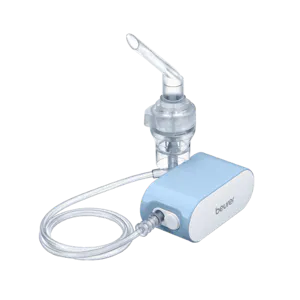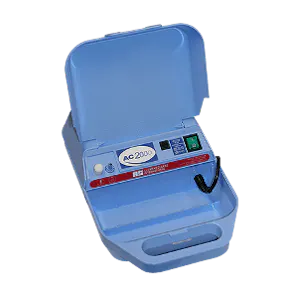What can I do about my COPD?
At last COPD is now receiving increasing attention from the medical community and you, too, can have a positive impact on your diagnosis.

“I have just been diagnosed with COPD” is a sentence we hear a lot.
COPD or chronic obstructive pulmonary disease is an umbrella term used to cover several lung diseases such as emphysema and persistent bronchitis. It describes a group of lung conditions that make it difficult to empty air out of the lungs because your airways have been narrowed, broken down or become inflamed. This makes it harder to move air in and out as you breathe, and your lungs are less able to take in oxygen and get rid of carbon dioxide. Current figures show as many as 2 million people in the UK have been diagnosed with COPD and up to three times as many people may have not yet been diagnosed. Nearly 30,000 people die from COPD annually and over 1 million bed days per year are taken up by COPD patients. Alarming statistics and these figures are set to rise.
Causes
COPD usually develops because of long-term damage to your lungs from breathing in a harmful substance such as cigarette smoke, air pollution, dust, fumes or chemicals but you’re more likely to develop COPD if you have been a smoker. Genes can also play a role too. COPD does seem to run in families, so if your parents had chest problems then your own risk is higher. A rare genetic condition called alpha-1-antitrypsin deficiency makes people very susceptible to develop COPD at a young age.
Treatment
These days, treatment options for COPD have multiplied and include improved inhalers and rehabilitation. Treatment has been revolutionised with the introduction of acute non-invasive ventilation but can also involve medications, nebulisers, oxygen therapy and surgery such as lung reduction surgery or a lung transplant. The organisation and delivery of care has also improved with the development of integrated care models and self-management strategies to help you look after your health and avoid hospital admission. This is where you come in. Knowing all you can about your condition, your symptoms, your medications and how to cope with flare-ups will make your day-to-day life easier. You will feel better if you self-manage your condition and take some control of your life. So why not start today and take a look at The British Lung Foundation - an excellent resource providing no nonsense, honest, clear and helpful information.
A multi-disciplinary approach
To help you achieve this NHS Right Care have just launched its latest pathway aimed at tackling COPD. They’ve done this in collaboration with the British Lung Foundation, the British Thoracic Society, Respiratory Futures, the Primary Care Respiratory Society (PCRS-UK), and the National COPD Audit Programme.
Key recommendations are ensuring early detection with accurate diagnosis and optimising long-term management to reduce exacerbations, hospital admissions and premature mortality. A multidisciplinary supportive care approach with clear signposting and navigation to help you access care and a psychological approach too, including help for the frightening breathlessness that comes with COPD. Community activation to overcome social isolation and help you stay physically active along with peer support and a self management plan supported by good information and patient training.
Where do you begin?
Exercise
If you tell a respiratory patient who has never been terribly active they have to become active, you’ll probably send a cold shiver up their spine but if you have COPD, being active and exercising can help you to improve your breathing, your fitness and your quality of life. Don’t avoid activities that make you breathless: you’ll get less fit and out of breath more easily. Regular exercise can help reverse this by strengthening your muscles. Exercise also benefits your heart and blood pressure, and makes you less likely to develop conditions such as diabetes and osteoporosis. To find out the best way to go about exercising why not ask your GP to refer you to pulmonary rehabilitation which are physical exercise sessions with advice and discussions about your lung health.
Controlling your breathing
These are techniques which if you practice them every day can help you to reduce breathlessness. They can also help if you get out of breath suddenly. Being in control of your breathing means breathing gently, using the least effort, with your shoulders supported and relaxed. The British Lung Foundation have put together a selection for you to try at home which you can find here.
Singing
Singing is a great activity for lung health as well as being joyful and uplifting. It brings positive feelings and helps to lift your mood even if you're feeling sad or depressed. Singing with a choir brings the added bonus of boosting your confidence as well as making you feel less isolated. There are lots of singing for health groups popping up all over the country and we’ve written more about why it’s such a beneficial activity on other pages in this blog.
Eating well and keeping a healthy weight
It sounds simple but when you have a lung condition it can seriously affect your appetite, some of you feel too breathless to eat, so little and often is the key. A balanced diet is important for general well being and lots of vitamins and minerals will help fight off infections. Conversely being overweight can increase your breathlessness. Your respiratory nurse or doctor can provide you will nutritional advice to suit you. Russell Winwood takes nutritional health to the next level. He is man who refuses to be defined by COPD and regularly competes in Iron man competitions and runs marathons despite only having very limited lung function. “Since adopting nutritional changes to my lifestyle, in particular using a ketogenic diet, I have seen my FEV1 rise to an average of 35%” You can follow his fundraising adventures on his blog.
Remember to get your vaccinations
Make sure you get your flu jab every year to protect you against the flu viruses likely to be going round over the winter. Every winter, hospitals and GP surgeries see an influx of people with lung conditions. Cold weather can bring on a flare-up. There are 80% more lung disease admissions in the winter months of December, January and February. The NHS offers the flu jab free to people living with long-term conditions like COPD. You should also be offered a vaccination against a bacterial infection that can cause pneumonia and other illnesses. It’s also important to avoid contact with others who have infections such as colds, coughs etc and if you do get an infection get it treated quickly.
Don’t bottle things up
It helps when you have a long term medical condition to understand your mood and what causes you to feel down. Once you understand it, you can take steps to tackle it and take greater control of your life. Talking to a friend, relative or a health care professional can help. Why not find a local Breathe Easy group to meet people who have lived through similar experiences, share advice and support each other. The British Lung Foundation keep a list of local support groups so have a look for the closest one to you.
What to do when you have an exacerbation
In order to mange flare ups it’s important to have an action plan. Symptoms may include getting more out of breath, more sputum or a change in its colour (is it green, brown, or yellow) perhaps an increased chesty cough. When this happens your action plan could include a rescue pack of medication, with a plan as to when you should start to take steroid tablets or when you should start to take antibiotics. This will usually be if you notice that as well as being more breathless, you’re producing more sputum than usual or it has changed colour. You may have to make changes in how you take your bronchodilator medicine, such as increasing the dose or changing how you take it, possibly using a spacer or a nebuliser. If your symptoms become severe you should get in touch with your medical professional or ring for an ambulance.
A diagnosis of COPD doesn’t mean that everything has to stop. Right now you might be reading this sitting at home fighting for your next breath. There is help out there. The internet is full of resources such as The British Lung Foundation who you can email or phone for advice. There are many blogs like Russell’s written by people who are happy to share their stories as well as hints and tips they have picked up along the way. Singing groups and Breathe Easy groups are littered up and down the country if you prefer support face to face or just fancy a chat. Respiratory nurses and doctors are more up to date than they have ever been and keen to assist you with all aspects of your COPD, and if anyone mentions a nebuliser or mucus clearance device you have us. You can ring, email or explore our website we’re always happy to help.
We supply models and accessories from the following reputable manufacturers.








